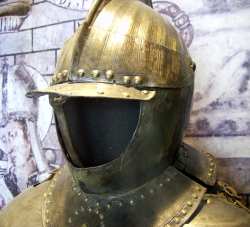The Fall of the Aztec Empire
What caused the fall of the Aztec empire? We do know that there were a number of factors involved, not just one. There are probably many factors that we don't know about that were already contributing to the weakness of the empire. But let's look at some of the most obvious, immediate factors:
The sacrifices
 Armour of a Spanish solder On display at the National Anthropological Museum, Mexico City |
There's little doubt that the ritual Aztec sacrifice contributed to the fall of the Aztec Empire, and in more ways than one. First, killing thousands of people, whether you or your neighbours, simply can't be good for a society. The loss of people in a loss that can't be calculated. Who knows how it would have been different if these people and their children had swelled the ranks that fought the Spanish, not to mention the other contributions they would have made.
And although the Aztecs certainly weren't the first people ever to sacrifice humans, the fact that they did and the incredible number they sacrificed led to the hatred of some of the surrounding peoples. The powerful city-state of Tlaxcala was one of these. Many of their own had been sacrificed, and in the end they joined the Spaniards to fight the Aztecs. It may be that the Spanish simply were an excuse to start what was already an inevitable civil war.
Lastly, it's believed that the horror of human sacrifice highly motivated the Spaniards to conquer what they considered an evil culture - in other words, they used it to justify their war with the empire.
Religion
Naturally, religion played a part because of the sacrifices. It has been commonly believed that, at first, the Aztecs thought that the Spanish were gods.
This belief is more and more being questioned - it may be a fabrication. Religious, yes, but the nobles were also well educated. Even if they did have such a passing thought, it's unlikely it lasted long. In addition, there's no reason to believe that Cortes and his men wouldn't have been welcomed anyway, with similar results. Modern scholars are questioning whether this belief in the return of the god Quetzalcoatl was real or a later rewrite of history.
Even more interesting is the theory that, at one point, the Aztecs did not completely destroy the Spanish army because they wanted more people to sacrifice to their gods. This was a tactical error that at least hastened the fall of the Aztec empire.
Disease
Disease played a huge part in the fall of the Aztec empire. Here's what happened.
After Cortes landed in Mexico, another Spanish army came from Cuba to make sure he followed orders. Cortes would have none of that, and went to fight them. In this new group was an African being held as a slave, who had smallpox, a very contagious disease.
One of Cortes' men contracted the disease. When they returned, the Aztec army quickly overwhelmed the Spanish, killing many and causing the rest to retreat. The soldier was killed, and, likely when his body was looted, an Aztec caught the disease.
Quickly, smallpox spread among the population. The people had no resistance and no idea how to treat it. In many cases, everyone in a house died. With no time to bury so many people, houses were simply demolished over the bodies. It is estimated that 5-8 million died.
During the siege of Tenochtitlán in 1520, the population was not only low on food but dying of smallpox. 25% of the empire is said to have been lost to the disease alone. But more importantly, the Aztec chain of command was in ruins. The emperor, Cuitláhuac, died of smallpox, along with many of the leaders of the army.
(Actually, there were a series of epidemics over the next 50-60 years, which killed far more than the first epidemic. Called by the Aztecs cocoliztli, much of the death toll may have been caused by salmonella enterica - typhoid (enteric) fever.)
Tactics
The tactics of the Spanish army certainly played a role. The Mexicas were simply used to playing by different rules. However, the Aztecs soon got wise to the ways that the Europeans fought, and this almost led to their victory. But Cortes still used clever tactics in the final siege that, in combination with his native allies and the epidemics of disease, brought about the fall of the Aztec empire.

Summary of the
Fall of the Aztec Empire
Here's a (very) brief summary of the fall of the Aztec empire, after the arrival of Hernando Cortes until the fall of Tenochtitlán (read a biography of Hernan Cortez here):
For more fascinating information about the fall of the Aztec Empire, check out Aztecs and Conquistadores: The Spanish Invasion and the Collapse of the Aztec Empire by Dr. John Pohl, Charles Robinson and Adam Hook.